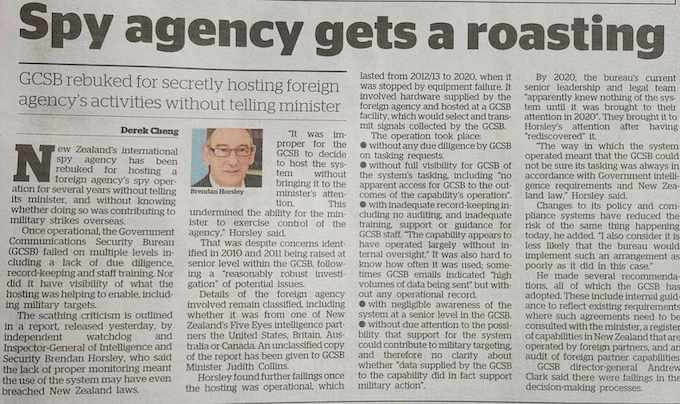Te Kuaka, an independent foreign policy advocacy group with a strong focus on the Pacific, has called for urgent changes to the law governing New Zealand’s security agency.
“Pacific countries will be asking legitimate questions about whether . . . spying in the Pacific was happening out of NZ,” it said today.
This follows revelations that a secret foreign spy operation run out of NZ’s Government Communications Security Bureau (GCSB) for seven years without the knowledge or approval of the government or Parliament.
- READ MORE: Foreign agency ran spy operation out of NZ’s GCSB for years
- NZ spy agency slammed for hosting foreign spying without telling minister or cabinet
- Other Te Kuaka reports
RNZ News reports today that the former minister responsible for the GCSB, Andrew Little, has admitted that it may never be known whether the foreign spy operation was supporting military action against another country.
New Zealand’s intelligence watchdog the Inspector-General of Intelligence and Security revealed its existence on Thursday, noting that the system operated from 2013-2020 and had the potential to be used to support military action against targets.
The operation was used to intercept military communications and identify targets in the GCSB’s area of operation, which centres on the Pacific.
In 2012, the GCSB signed up to the agreement without telling the then director-general and let the system operate without safeguards including adequate training, record-keeping or auditing.
When Little found out about it he supported it being referred to the Inspector-General for investigation.

Refused to name country
But he refused to say if he believed the covert operation was run by the United States although it was likely to be one of New Zealand’s Five Eyes partners, reports RNZ.
Te Kuaka said in a statement today the inquiry should prompt immediate law reform and widespread concern.
“This should be of major concern to all New Zealanders because we are not in control here”, said Te Kuaka member and constitutional lawyer Fuimaono Dylan Asafo.
“The inquiry reveals that our policies and laws are not fit for purpose, and that they do not cover the operation of foreign agencies within New Zealand.”
It appeared from the inquiry that even GCSB itself had lost track of the system and did not know its full purpose, Te Kuaka said.
It was “rediscovered” following concerns about another partner system hosted by GCSB.
While there have been suggestions the system was established under previously lax legislation, its operation continued through several agency and legislative reviews.
Ultimately, the inquiry found “that the Bureau could not be sure [its operation] was always in accordance with government intelligence requirements, New Zealand law and the provisions of the [Memorandum of Understanding establishing it]”.
‘Unknowingly complicit’
“We do not know what military activities were undertaken using New Zealand’s equipment and base, and this could make us unknowingly complicit in serious breaches of international law”, Fuimaono said.
“The law needs changing to explicitly prohibit what has occurred here.”
The foreign policy group has also raised the alarm that New Zealand’s involvement in the AUKUS security pact could compound problems raised by this inquiry.
AUKUS is a trilateral security pact between Australia, the UK and the US that aims to contain China.
Pillar Two’s objective is to win the next generation arms race being shaped by new autonomous weapons platforms, electronic warfare systems, and hypersonic missiles.
It also involves intelligence sharing with AI-driven targeting systems and nuclear-capable assets.
‘Pacific questions’
“Pacific countries will be asking legitimate questions about whether this revelation indicates that spying in the Pacific was happening out of NZ, without any knowledge of ministers”, said Te Kuaka co-director Marco de Jong.
“New Zealand’s involvement in AUKUS Pillar II could further threaten the trust that we have built with Pacific countries, and others may ask whether involvement in that pact — with closer ties to the US — will increase the risk that our intelligence agencies will become entangled in other countries’ operations, and other people’s wars, without proper oversight.”
Te Kuaka has previously spoken out about concerns over AUKUS Pillar II.
“We understand that there is some sensitivity in this matter, but the security and intelligence agencies should front up to ministers here in a public setting to explain how this was allowed to happen,” De Jong said.
He added that the agencies needed to assure the public that serious military or other operations were not conducted from NZ soil without democratic oversight.”

